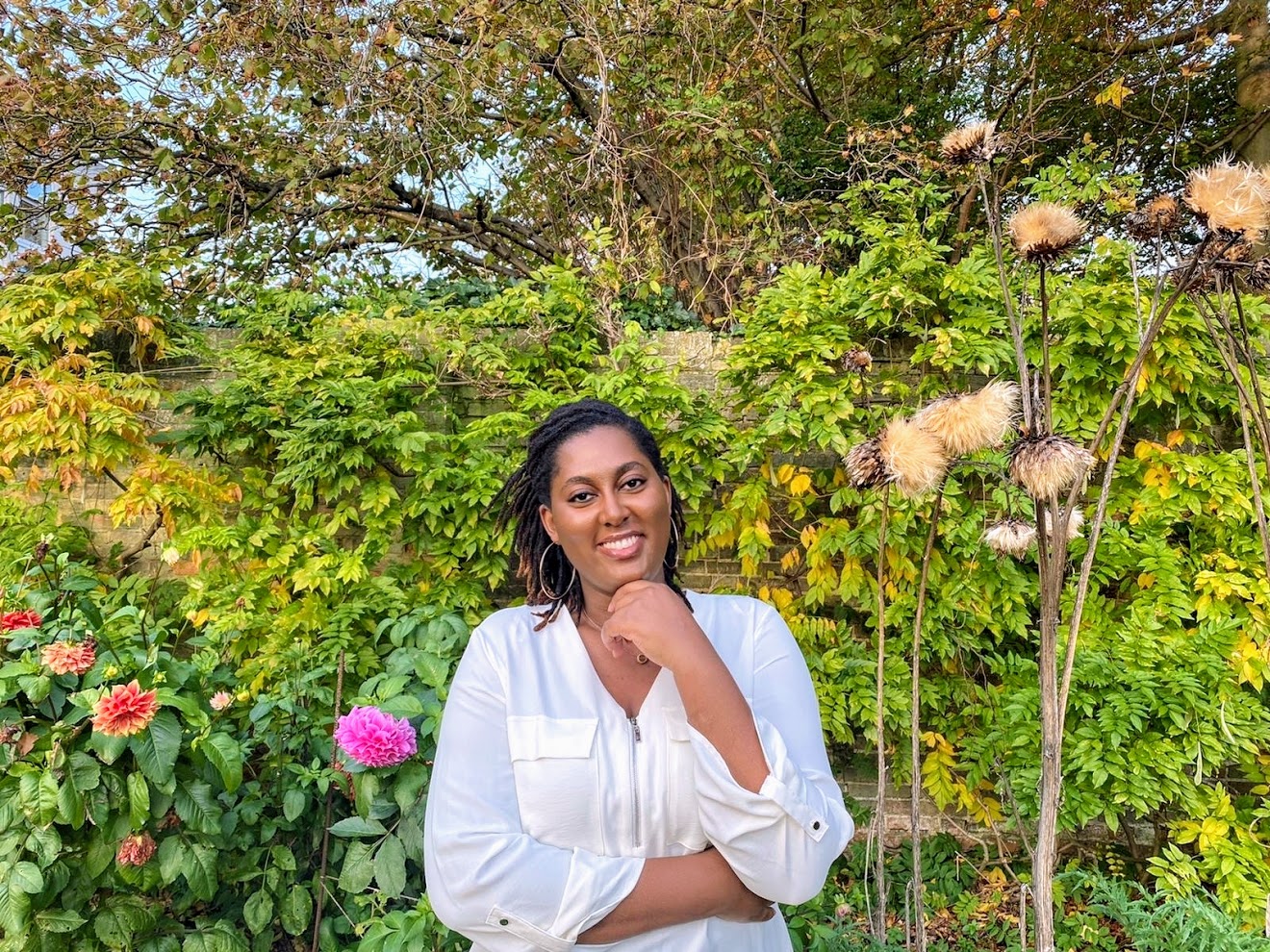
Amelia Amemate talks about her studies and activism around gender issues.
I want to understand the systems and structures that support hostility to women and non-binary people and how technology is changing attitudes.
Amelia Amemate
Amelia Amemate [2020] has spent much of her life striving to challenge gender norms. Like many women in Ghana and elsewhere, she was expected to get married and focus on the home; at university, she faced sexism and hostility when she campaigned for women’s rights; and in the workplace, she was told her Afro hair was unacceptable. Those experiences have fuelled her desire for greater ethnic and gender equality. Her PhD at Cambridge will further that alongside her continuing work to contribute to change in Ghana and beyond.
Amelia was born in Keta, a coastal town in southern Ghana. She describes her hometown as a land between the lagoon and the sea. Her father is a fisherman and her mother is a vegetable trader. She is the oldest of four children and was the first in her immediate family to go to university. All her siblings have since followed that path.
Although Amelia received the second-highest academic scores in her junior high school, her father said any further education was unnecessary. Her mother, however, believed in the importance of educating girls and sold some items to fund Amelia’s studies at senior high school. “She was my number one cheerleader,” says Amelia, who dedicated her master’s thesis to her mother.
Even as a young child, she says she was different from other children in the kind of questions she asked. At school, her strengths lay in arts and reading subjects like social studies and English literature, but she won awards in both academic and non-academic activities. Nevertheless, she says girls were rated more for their looks than their brains. She received several offers to be a model from the age of 11 and became a beauty queen in her local area at the age of 18. She decided, however, to focus on her studies instead.
Undergraduate studies and activism
Amelia passed the West African Senior School Certificate Examination (WASSCE) in 2009, but once again faced financial challenges to continue her studies since her father was still unwilling to assist her. In the end, her maternal uncle and her mother paid for her university education at the University of Ghana, Legon. Amelia did a four-year course, initially focused on Political Science, English and Archaeology. She subsequently majored and minored in Political Science and Archaeology.
Amelia’s awareness of gender discrimination grew over her time at university, with two experiences, in particular, having a powerful impact. The first involved sexual harassment. She says her thesis supervisor harassed her on numerous occasions and told her he would not supervise or pass her thesis if she did not have sex with him. She refused and ended up having to forego her thesis research. Fortunately, she was still able to amass enough credits to graduate because she had taken extra courses during her studies.
Earlier this year, the BBC did a documentary on sexual harassment in West African universities. Amelia’s former supervisor was one of the professors captured on the tape trying to sexually harass journalists who posed as students. Amelia took the opportunity to write about her encounter in the media, describing her experience as a common occurrence in Ghanaian schools and workplaces. Even so, she says she was interrogated about her experience as if she had committed the abuse rather than the other way around. “That’s why so many women don’t come forward,” she says. The professor was temporarily suspended, but Amelia says that he should have been banned from teaching, given she could have lost her whole university career as a result of the incident.
The second experience involved student politics. Having realised early on in her course that the Student Representative Council (SRC) was invariably led by men, Amelia decided to run for student president. She faced overwhelming hostility and was asked by university officials to stand down her campaign even though she satisfied all the eligibility requirements. She took the case to court on two different occasions. But in spite of winning the first case which gave her and her running mate a place in the elections, she was forced to drop the second due to the threats she received.
Challenging gender norms
Those experiences made Amelia even more determined to do what she could to change the system so she applied to law school. While she was applying, she worked for a company where she was told she could not wear her hair in its natural Afro style and was stopped from attending a conference as a result. Amelia wrote an article about this which went viral, but she says the majority felt that her boss was right to enforce such a workplace hair policy. She says: “The standard of beauty for the corporate world is the opposite of what African women look like.”
Since the article brought a lot of criticism, Amelia decided to do something about it. She deferred her law course at the University of Ghana’s School of Law to go to the US to do a two-year master’s programme. Her master’s dissertation focused on understanding how African women came to prefer relaxed hair and wear weaves over their hair. Amelia says: “I saw the need for our people to understand that their hair is good enough and that they don’t have to change how they look.”
She won a scholarship to Bowling Green State University in Ohio, having chosen the US because much work had already been done on natural hair there. “In the US it was an established topic, but in Ghana, it wasn’t even up for discussion,” she says. Amelia won two of the most prestigious awards during her master’s education at Bowling Green State University as a result of her activism and research work in the area of gender studies: Outstanding International Graduate Student Award – 2019, and Best Paper and Presentation – Graduate Category – Embracing Global Perspectives Conference/Awards. During her time in the US, she was involved in several student leadership activities. She also worked for a student charity organisation that was engaged in addressing issues of homelessness within mainly Black and Hispanic communities. Amelia says her work outside the confines of the classroom opened her eyes to another side of American life.
Community work
Amelia had been doing community work in Ghana before going to the US, for instance, collaborating with health professionals from European countries to teach traditional birth attendants safe birthing techniques in some of Ghana’s most remote regions. That and her work for the Moremi Initiative for Young Women’s Leadership in Africa enabled her to take part in the 2017 MILEAD fellowship for exceptional emerging African women leaders. Her gender equality activism work in Ghana and her involvement with Moremi exposed her to UN Women whose conferences she has been a part of for the past three years. In 2019, she presented a paper on Ghanaian women, technology and gender equality work at a side event during the session of the Commission on the Status of Women.
When her master’s course came to an end, she decided to continue her studies by doing a PhD in Multi-disciplinary Gender Studies. She applied to the University of Cambridge and Gates Cambridge. Her PhD, under the supervision of Dr Holly Porter, will focus on how Ewe and Akan cultural norms contribute to gender inequality and how technology impacts on these gender relations in Ghana. She says: “I believe my PhD is essential for the policies Ghana will make in the future. I want to understand the systems and structures that support hostility to women and non-binary people and how technology is changing attitudes. I want to see a better world and to improve the chances for all people in my country.”
Amelia says that, while pursuing her studies, she will continue her gender activism, which includes working with Moremi, UN Women and fellow feminists in Ghana.












